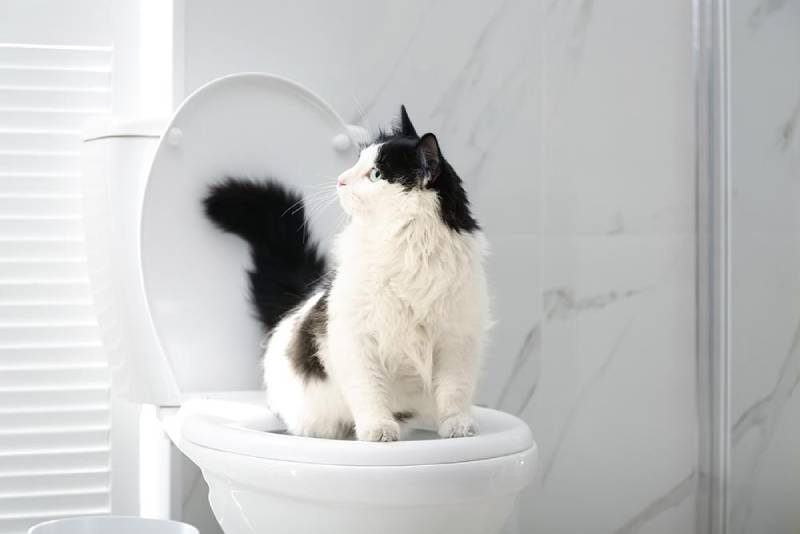Potential Risks of Flushing Cat Poop Down Your Toilet - Tips for Better Disposal
Potential Risks of Flushing Cat Poop Down Your Toilet - Tips for Better Disposal
Blog Article
The content in the next paragraphs in relation to How to Dispose of Cat Poop and Litter Without Plastic Bags is fairly informative. Have a go and draw your own final thoughts.

Introduction
As feline proprietors, it's vital to bear in mind exactly how we take care of our feline pals' waste. While it might appear practical to flush feline poop down the bathroom, this technique can have detrimental effects for both the environment and human health and wellness.
Environmental Impact
Flushing pet cat poop presents damaging pathogens and bloodsuckers into the supply of water, posturing a substantial danger to aquatic ecosystems. These contaminants can adversely impact marine life and compromise water high quality.
Wellness Risks
Along with ecological issues, purging feline waste can additionally posture health and wellness risks to people. Pet cat feces may have Toxoplasma gondii, a parasite that can trigger toxoplasmosis-- a possibly serious disease, specifically for expecting women and individuals with weakened immune systems.
Alternatives to Flushing
The good news is, there are more secure and much more responsible means to throw away pet cat poop. Take into consideration the following choices:
1. Scoop and Dispose in Trash
The most usual method of getting rid of feline poop is to scoop it right into an eco-friendly bag and throw it in the garbage. Make sure to utilize a specialized clutter inside story and get rid of the waste quickly.
2. Usage Biodegradable Litter
Opt for biodegradable feline clutter made from materials such as corn or wheat. These clutters are eco-friendly and can be securely gotten rid of in the trash.
3. Hide in the Yard
If you have a backyard, consider burying pet cat waste in an assigned area far from veggie yards and water resources. Be sure to dig deep sufficient to stop contamination of groundwater.
4. Mount a Pet Waste Disposal System
Buy a pet waste disposal system particularly developed for pet cat waste. These systems use enzymes to break down the waste, reducing odor and ecological influence.
Final thought
Accountable pet dog ownership prolongs beyond offering food and sanctuary-- it likewise entails correct waste administration. By avoiding purging feline poop down the toilet and going with alternative disposal techniques, we can reduce our ecological footprint and safeguard human health.
Why You Should Never Flush Cat Poop Down the Toilet
A rose by any other name might smell as sweet, but not all poop is created equal. Toilets, and our sewage systems, are designed for human excrement, not animal waste. It might seem like it couldn’t hurt to toss cat feces into the loo, but it’s not a good idea to flush cat poop in the toilet.
First and foremost, assuming your cat uses a litter box, any waste is going to have litter on it. And even the smallest amount of litter can wreak havoc on plumbing.
Over time, small amounts build up, filling up your septic system. Most litter sold today is clumping; it is made from a type of clay that hardens when it gets wet. Ever tried to scrape old clumps from the bottom of a litter box? You know just how cement-hard it can get!
Now imagine just a small clump of that stuck in your pipes. A simple de-clogger like Drano isn’t going to cut it. And that means it’s going to cost you big time to fix it.
Parasitic Contamination
Believe it or not, your healthy kitty may be harboring a nasty parasite. Only cats excrete Toxoplasma in their feces. Yet it rarely causes serious health issues in the cats that are infected. Most people will be fine too if infected. Only pregnant women and people with compromised immune systems are at risk. (If you’ve ever heard how women who are expecting are excused from litter cleaning duty, Toxoplasma is why.)
But other animals may have a problem if infected with the parasite. And human water treatment systems aren’t designed to handle it. As a result, the systems don’t remove the parasite before discharging wastewater into local waterways. Fish, shellfish, and other marine life — otters in particular — are susceptible to toxoplasma. If exposed, most will end up with brain damage and many will die.
Depending on the species of fish, they may end up on someone’s fish hook and, ultimately on someone’s dinner plate. If that someone has a chronic illness, they’re at risk.
Skip the Toilet Training
We know there are folks out there who like to toilet train their cats. And we give them props, it takes a lot of work. But thanks to the toxoplasma, it’s not a good idea.

I recently found that blog entry about Can You Flush Cat Poo or Litter Down the Toilet? when doing a search on the web. Those who liked our blog entry please remember to share it. Bless you for your time. Visit again soon.
Click Here Report this page